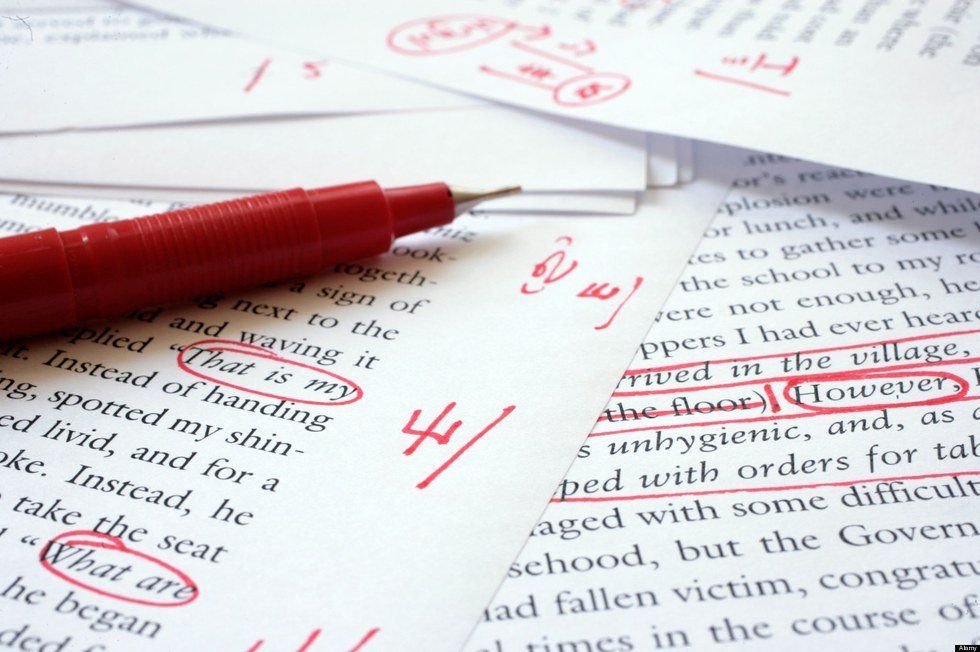As a journalism major, I'm expected to do a lot of writing. I know it's something I'm good at, but it's not something I necessarily enjoy. In fact, I actually want to pursue a career in editing, which I have a lot of experience with.
While I was growing up I would edit my parents' emails and business reports. During high school — and even now in college — my friends would ask me to look over their papers so that they could have a better chance at getting a good grade.
Now, I'm an editor for three different on-campus publications, which is something I find both challenging and rewarding.
Through trial and error, I've learned some things that have helped me edit peoples' writing better, so I've compiled a few below.
1. Be flexible
Usually, I'll get briefed on the topic of any new writing that I look over, but other than that, I try not to go in with any expectations. Like their authors, each written work is unique and requires adaptation and adjustment to effectively edit.
If you approach someone's writing with an open mind, you'll be able to provide the fresh perspective that writers need when seeking out your help.
2. Get to know the writer
You don't have to be friends with the writer you're working with per se, but it's helpful to know how the writer works and what they're expecting from edits.
Some like it when editors dive in and make changes, others don't want changes at all and only want comments and feedback for more creative control. Some are only looking for technical edits while others will want to discuss their writing with you in-depth and ask for your input and opinion. It all really depends on the individual.
Taking this extra step to know your writer makes sure that you're both on the same page and cuts down on potential miscommunication and frustrations.
3. Be honest
While there are such things as good and bad writers, writing is still a skill that requires time and practice to improve on. Part of improving one's writing is criticism, and criticism tends to come from editors.
Personally, I find it difficult to offer criticism while editing, especially if the writing is difficult to read since I hate being a negative person and hurting people's feelings. This is why I tend to admire other editors who can read someone's work, bluntly say, "This sucks. Start over," and not feel guilty about it because they know they're right.
I go with a more diplomatic approach by also bringing up what the writer did well and making sure that they know I'm being sincere.
While you're free to take any kind of approach to criticism that you feel is right, you won't help your writers if you only point out the good and ignore the bad for whatever reason.
You edit to better someone's writing, not inflate their egos.
4. Know your "zone"
Doing any kind of detail-oriented work requires the right environment. If you want to edit someone's work efficiently and thoroughly, you need to be in a place where you won't be distracted and can read critically.
For me, I edit best when I'm in my room and listening to soft music on my headphones. It helps me tune things out and focus on what's in front of me.
5. Establish a flow
Editing can be quite tedious, so it's good to set a pattern for how you edit to prevent boredom and/or inattention.
Nowadays, I usually edit essays and articles which average anywhere between 300 to 2,000 words, but I follow the same format while editing them since they don't take long to read.
I skim through the whole work once to get a feel for the content and the writing style, then I make edits paragraph by paragraph, often skimming through things again to make sure it's all working together.
If the writer is okay with it, I go ahead and correct grammatical errors. If something needs to be deleted or placed somewhere else, I either highlight it or make a comment, then come back to it later when I'm done going through everything to make sure that the edit still applies.
I also make sure to take lots of breaks or just put it down for the day when I know that I've reached my limit and can't figure out if what I'm editing makes sense anymore.
Whatever your flow, it's important to know what works best for you as an editor.





















